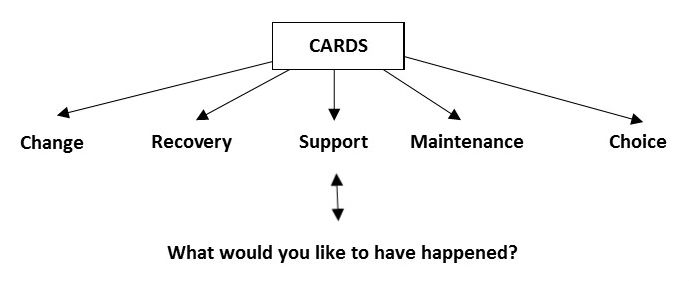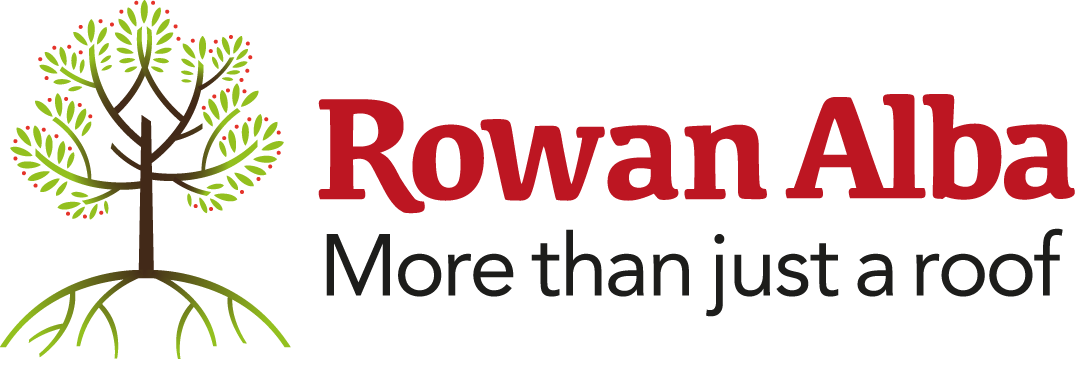Volunteering for CARDS
Peer support
Peer support is when people use their own experiences to help others. We use peer support to bring people with shared experiences together to create positive change.
At CARDS we have recently included a PEER SUPPORT element to complement the range of the support that we can offer. This step was taken in response to feedback received from our volunteers and Clients who felt that the sharing of “Lived Experience” in the correct context would be beneficial in supporting positive change.
What we have learnt so far
The introduction of a Peer worker/volunteers has transformed the CARDS service in many ways; it has importantly reduced stigma and increased understanding around alcohol dependency for our clients, volunteers, staff and the wider community that we are in contact with. Healthier conversations have led and will continue to lead to healthier experiences for staff, volunteers and service users.
CARDS sits outside the ‘recovery bubble’ and gives people in recovery the opportunity to take that step. Other recovery initiatives are moving toward the wider community and CARDS is an ideal partner for this. CARDS is not a recovery program however it does promote positive change and comfortably sits alongside and complements other clinical services.
The recruitment of Peer Support Worker from our existing volunteer pool was a successful demonstration of path from service user to volunteer to employability. Since the recruitment of peer volunteers we have recorded a more equal spread of age ranges across the volunteer pool. The result is a more diverse volunteer pool. We have also recorded a higher retention rate from Peer volunteers versus other volunteers (from application to recruitment).
The Introduction of Peer element has also led to change/development of policies and procedures based on the learning from peers. This learning has been applied to policies and procedures that are applicable to all staff and volunteers around recruitment (self-care) and boundaries (co-dependency, self-disclosure).
We are continually learning and evolving based on the learning from all of our volunteers and welcome YOUR FEEDBACK on how the CARDS service can develop. Feedback can be given directly to CARDS by contacting the team or you can bring any feedback you have to a supervision session.
We are also happy to share our learning with you by giving you access to reports we compile for our various funders.
A popular way of describing peer support is that they are individuals who have “Been through the jungle and know all the animals” demonstrating that change is possible and can be safely negotiated.
The fundamental ethos of CARDS is unaffected by this new service. We remain a person centred service respecting any individual’s right to make their own choices, the addition of Peer Support merely adds to our uniqueness.
We are not a recovery program! We do support change! Whether that be with alcohol, self-esteem, confidence, social skills or just moving toward a healthier lifestyle.
Peer support, to us is Recovery support.
Clients may be –
- In recovery and want support to maintain that.
- Moving from a residential abstinence based program and need support integrating back into the community.
- Curious about making a change, whatever that may mean to them.

Support, Supervision and Training
Peer Volunteers are encouraged to attend all volunteer events and team meetings, particularly the sessions with Adam Burley. It is important that we integrate with all the CARDS team and inspire them to utilise our experience.
Please take specific note of the Coaching Training availability. I cannot stress enough how useful this technique is in promoting and encouraging positivity in a peer relationship. Find out more about supervision dates on our supervision and coaching page, and additional volunteer training opportunities by clicking the links below.
Useful information about volunteering
Ongoing support for learning & development
Volunteer resources & Forms
Covid and volunteering
Getting help from CARDS
Evaluations & reports
